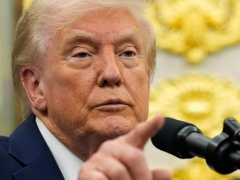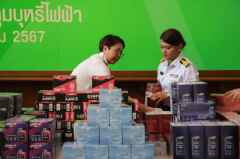United States President Donald Trump has unveiled a second deal with a major pharmaceutical company to offer lower-cost prescription drugs direct to American consumers.
This time, the agreement concerned AstraZeneca, a multinational based in the United Kingdom.
Recommended Stories
list of 3 items
- list 1 of 3Trump’s latest 100 percent tariff on pharmaceuticals: What we know
- list 2 of 3Pfizer strikes deal with Trump administration to cut US drug prices
- list 3 of 3What is Trump’s new TrumpRx website and will it bring medicine prices down?
end of list
Trump hosted the company’s chief executive, Pascal Soriot, in the Oval Office on Friday to publicly cement the deal, which he described as “another historic achievement in our quest to lower drug prices for all Americans”.
“Americans can expect discounts, and as I said, it could be, in many cases, way over a hundred percent,” Trump said.
As in previous press appearances, he pledged US consumers would see impossible discounts on popular medications.
Inhalers to treat asthma, for example, would be discounted by 654 percent, Trump said, calling the device a “drug that’s hot, very hot”. He also reiterated past claims that some medications could see “a thousand percent reduction”.
Trump has long pushed to reduce prescription drug costs to what he has billed as “most-favoured nations prices”.
That would bring prices down to the same level as in other developed countries, though Trump, with typical hyperbole, has said the policy would equate to “the lowest price anywhere in the world”.

AstraZeneca is the second major pharmaceutical company after Pfizer to strike such a bargain. Last month, Pfizer announced a “voluntary agreement” to price its products “at parity with other key developed markets”.
Like AstraZeneca, it also agreed to participate in an online, direct-to-consumer marketplace the Trump administration plans to launch, called TrumpRx.
But in a news release on its website, Pfizer made clear that the agreement would help it dodge the high tariffs that Trump threatened against overseas pharmaceutical manufacturers.
“We now have the certainty and stability we need on two critical fronts, tariffs and pricing, that have suppressed the industry’s valuations to historic lows,” Pfizer CEO Albert Bourla said.
At Friday’s Oval Office ceremony, officials like Health and Human Services Secretary Robert F Kennedy Jr openly celebrated the power Trump had wielded through his tariff threats.
“ The president saw something that we didn’t see, which is we had leverage, and that came through Howard [Lutnick] and the tariffs,” Kennedy said, giving a nod to Trump’s commerce secretary. “We had extraordinary leverage to craft these deals.”
The deals with both AstraZeneca and Pfizer came after Trump threatened in September to impose a 100-percent tariff on pharmaceutical companies unless they started to build manufacturing plants in the US.
“There will, therefore, be no Tariff on these Pharmaceutical Products if construction has started,” Trump wrote on his platform, Truth Social.
Those tariffs were slated to come into effect on October 1. But Pfizer unveiled its deal with the Trump administration on September 30, and the tariffs were subsequently postponed.
In Friday’s Oval Office appearance, Soriot acknowledged that, like Pfizer, he had negotiated a delay for any tariffs against AstraZeneca. In exchange, he pledged to increase US investments to $50bn by 2030.
“I appreciate very much Secretary Lutnick granting us a three-year tariff exemption to localise the remainder of our products,” Soriot said. “Most of our products are locally manufactured, but we need to transfer the





